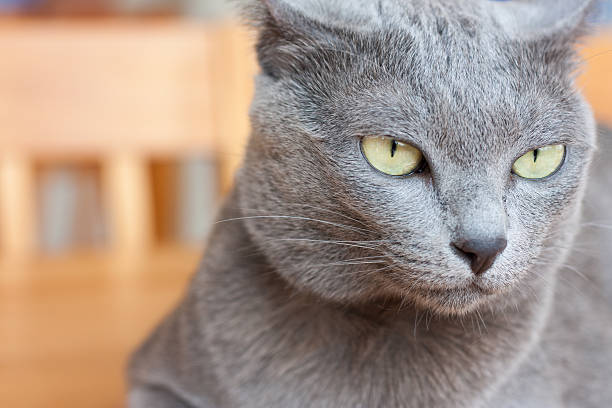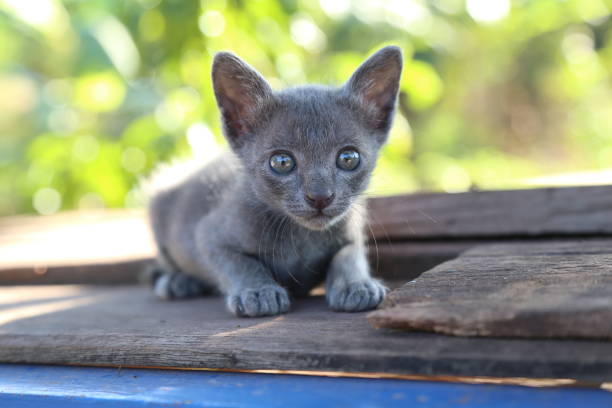Korat

History:
The Korat is one of the oldest and most revered natural cat breeds in Thailand, known as “Si-Sawat.” It is considered a symbol of good luck and prosperity, historically given as a gift rather than sold. References to the Korat appear in the ancient Thai manuscript Tamra Maew (“The Cat-Book Poems”), dating back to the 14th century. The breed was first introduced to the West in the late 19th century but did not gain a strong foothold until the 1950s, when Korats were brought to the United States by a couple stationed in Thailand. Today, the Korat is prized for its shimmering silver-blue coat, heart-shaped face, and strong bond with humans. Though not as widespread as other breeds, it maintains a loyal following worldwide.
Size: Medium-sized cat
Height: 25–30 cm
Weight: 2.5–4.5 kg
Life Expectancy: 15 to 20 years

Breed Appearance:
The Korat is a graceful, muscular cat with a distinctive heart-shaped face, large green eyes, and a short, close-lying coat. Its body is semi-cobby—compact but solid and strong, giving the impression of surprising weight when lifted. The coat is a hallmark of the breed: single-layered, short, and fine with a unique silver-blue colour that shimmers due to the silver tipping on each hair shaft. The eyes are large, luminous, and usually vivid green, although they may appear amber or hazel in younger cats before reaching full maturity. The ears are large and flared, adding to the breed’s alert, expressive look. The tail is medium-length and slightly tapered, complementing the cat’s balanced proportions.
Health & Care:
Korats are generally a healthy, long-lived breed, but they can be prone to a genetic condition known as gangliosidosis (a rare neurological disorder), which responsible breeders now screen for. Overall, the breed benefits from routine veterinary care, a balanced diet, and a safe indoor environment. Their short coat requires minimal grooming, typically needing only occasional brushing to remove loose hair and maintain its natural sheen. Korats have sensitive respiratory systems, so they should be protected from harsh chemicals or smoke. Because they are emotionally sensitive and dislike loud or chaotic environments, a calm, stable home best suits their well-being.

Living Conditions:
Korats thrive in quiet, loving households where they can form strong attachments to their people. They do well in both apartments and houses, provided they have companionship and environmental enrichment. Korats are highly people-oriented and prefer not to be left alone for extended periods. They are intelligent, communicative, and observant cats that enjoy being involved in household routines. While not typically destructive, they do require mental stimulation and gentle play to stay active. Korats are usually reserved with strangers but extremely affectionate with their families, often choosing one person as their special favourite.
Grooming:
Korats have a low-maintenance grooming routine thanks to their short, single-layer coat. Weekly brushing is sufficient to remove dead hair and keep their coat sleek and shiny. Bathing is rarely necessary, as the coat naturally resists dirt. Regular ear cleaning, nail trimming, and dental care should be part of their routine, especially since Korats are known for being sensitive to changes in health or hygiene. Their minimal shedding and easy grooming needs make them ideal for owners who want a clean and elegant companion with little upkeep.

Advantages:
-
Korats are affectionate, loyal, and intelligent cats that form strong emotional bonds with their families.
-
Their shimmering silver-blue coat and striking green eyes make them visually unique and highly prized.
-
They are quiet and gentle, ideal for calm households or apartment living.
-
Low grooming needs and minimal shedding make them easy to care for.
-
Korats are playful without being hyperactive and thrive on interactive, thoughtful engagement.
Disadvantages:
-
They are emotionally sensitive and may become stressed by loud environments, frequent changes, or long periods of solitude.
-
Their reserved nature means they may be shy or aloof around strangers or in new situations.
-
As a rare breed, Korats can be difficult to find and may be expensive to purchase.
-
They are prone to a rare inherited neurological condition, gangliosidosis, which requires genetic testing by breeders.
-
Korats demand attention and do best in homes where they are not left alone for long periods, requiring dedicated companionship.

